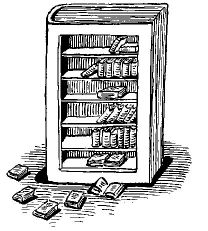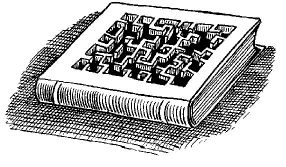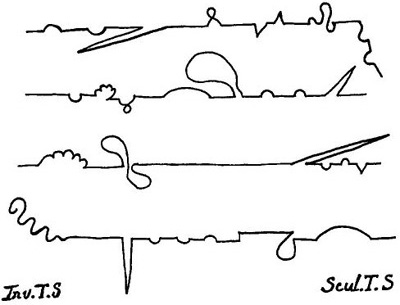The Book of Lost Books (27 page)

In book II, the heroes reach the Fortunate Islands, an uninhabited paradise where they want for nothing. Many of his companions recommend settling there: Brutus, however, knows that their mission is not only to seek their own comfort, but to bring the benefits of civilization to a benighted people. They continue their quest, leaving behind the elderly and those unfit for active service, turning Tenerife into the first retirement home.
They are subsequently blown to Lisbon, then known as Ulyssport. There, they meet the son of a Trojan captured by the cunning Ulysses, who recounts the founding of their city. Ulysses had sought to govern through Superstition and Wickedness, and had enslaved the population. They rose up against him, and, although they murdered the tyrant, they now lack leadership. Brutus “leaves one of his own people to govern 'em, and abolish ye new Gods introduced by Ulysses.”
Book III brings the Trojans to Britain. Landing in Torbay, Brutus encounters the Druids. They are monotheists, as he was led to believe, and worship the sun, offering fruits and flowers on an altar made of turf. “No bloody sacrifices,” Pope notes.
The idyllic existence of these noble savages is under threat. In the east and north, there are giants, most notably Gogmagog and Corinaeus, whose castles are protected by thunder and lightning. Brutus resolves to defeat these monsters, and, it seems, he would show how their supposedly supernatural powers are founded on deceits and priestly superstitions. Their magical storms would be revealed as gunpowder.
Pope sketched out some of the other characters: an “old cautious counsellor,” “a soldier seeking only Plunder,” and “a bloody cruel hero, always for violent Measures.” Aside from the tyrannical giants, scenes were planned in which Brutus would face difficulties in his own camp, especially from “The Achilles, Alexander, Rinaldo” character. In contrast to the wise and judicious Brutus, this figure was impetuous, “fierce, ambitious, brave to excess.” Instead of cooperating with the Druids, this intemperate young blade would prefer to conquer by force, and even cause a rebellion by kidnapping a local princess betrothed to another.
Although the giants would pass off their technological superiority as supernatural powers, there would have been bona fide supernatural entities in the poem. These guardian angels and demonic adversaries were authorized by scripture and literature, and Pope planned to use the names of Milton's devils for his “spiritual machinery.”
Toward the end of the poem, Brutus would receive another oracle from an aged Druid. The prophecy would remedy the poem's major narrative problem: if Brutus was successful in establishing a society based on Virtue and Truth, why did the Romans discover an island controlled by Picts and pagans four hundred years later? “The Britons shou'd Degener over an Age of Two, and Relapse into a degree of Barbarism, but that they shou'd be Redeemed again by a Descendant of his [Brutus'] family out of Italy, Julius Caesar, under whose successes they shou'd be Repolished & that the love of Liberty he had introduced, the Martial Spirit & other Moral Virtues shou'd never be lost. With observations upon the Impossibility of any Institution being Perpetuall.”
Pope succumbed to his illness in May 1744. He was delirious for a week, and claimed to see an arm coming through the wall. Had he lived,
Brutus
would have been a major literary event. It would, no doubt, still be read today, even if its dogmatic insistence on certain theories of government had somewhat tarnished its appeal. Benjamin Martin, a minor eighteenth-century playwright, who had heard of the proposed poem, thought it would be “a performance equal to the Iliad or the Aeneid.” Samuel Johnson rather huffily referred to it as “a ridiculous fiction” and castigated Pope for being “thoughtless enough to model the names of his heroes with terminations not consistent with the time or country in which he places them.” Johnson decided it had been abandoned “without much loss to mankind.”
Pope wrote the opening eight lines of the
Brutus.
The Patient Chief, who lab'ring long arriv'd
On Britain's shores and brought with fav'ring Gods
Arts Arms & Honour to her Ancient sons:
Daughter of Memory! from elder Time
Recall; and me with Britains Glory fir'd
Me far from meaner Care or meaner Song,
Snatch to the Holy Hill of spotless Bay,
My Countrys Poet, to record her Fame.
Unexceptional, by any standard, except for one curious difference from the rest of his oeuvre. The lines from
Brutus
are in blank verse, rather than rhyming couplets. At the end, Pope forgoes the form he perfected, and squares up to his only English rival: Milton.

Dr. Samuel Johnson
{1709â1784}
THE GREAT CHAM, moralist and manic depressive, succumbed in his last years to the desire to preempt posterity. As his assiduous and exasperating biographer James Boswell (the blubbering Stan to Sam's impatient Ollie) records:
The consideration of the numerous papers of which he was possessed, seems to have struck Johnson's mind with a sudden anxiety, and as they were in great confusion, it is much to be lamented that he had not entrusted some faithful and discreet person with the care and selection of them; instead of which, he, in a precipitate manner, burnt large masses of them, with little regard, as I apprehend, to discrimination.
Which “faithful and discreet” individual did Boswell have in mind? A few moments earlier he had informed the reader that Johnson had been working on a journal concerning his sicknessâat the time, he was suffering from racking attacks of asthma and dropsy, as well as his perpetual struggle with melancholyâand that the
Aegri Ephemeris,
as it was called, was now in Boswell's careful hands.
Boswell's wistful reminiscence of the literary conflagration is further compromised. Why the passive voiceâ“of which he was possessed”? Was Johnson bewitched by his own productions, unwilling host to his own words? Given his rash and incendiary urges, were the papers alone in confusion?
The story layers itself further. Among the burned papers, Boswell remembers, were “two quarto volumes, containing a full, fair, and most particular account of his own life, from his earliest recollection.” Exactly the kind of manuscript, one is tempted to speculate, which, if published, would seriously stymie interest in any forthcoming biography. Boswell admits to Johnson that he, poor soul, simply could not help himself but sneak a little peekâor, as he says, “read a great deal in them.” Johnson, magnanimously, concurs that Boswell could not have helped himself. But more: the penitent future biographer confesses that, for the first time in his life, the idea seized him to actually steal the two volumes, and abscond, never to see Johnson again. In a pitch of considerateness, he asks his breathless and bloated mentor how this would have made him feel. “Sir, (said he,) I believe I should have gone mad.”
Mad for loss of the friend or for the loss of the manuscript? In fact, Boswell's competitor, Sir John Hawkins, had stolen one of the volumes. It was returned when Johnson confronted Hawkins in surprisingly similar terms: his excuse had been to keep them out of the hands of another prospective biographer, George Steevens, who would “make ill use of them.” What had both men read in the Doctor's self-diagnosis? “There is something noble in publishing truth, though it condemns one's self,” pronounced Johnson, or at least so Boswell recalled him once saying.
The Scotsman drops dark hints that Johnson's “amorous inclinations were uncommonly strong” and that, when younger, he was “not so strictly virtuous.” He had “take[n] women of the town to taverns, and hear[d] them relate their histories.” Even on Coll in the Hebrides, Boswell had witnessed the lion of literary London bouncing a Scots lassie on his knee, a moment unmentioned by Cham in his narrative. Turning his gaze upon his own tics and black dogs, his uncontrollable outbursts and fearsome prickings of the flesh, did the high-minded Dr. Johnson pen a confession?
So
The Erotic Autobiography of Dr. Samuel Johnson
crumbles into ash, and
The Life of Samuel Johnson LLD comprehending an account of
his studies and numerous works, in chronological order; a series of his epistolary
correspondence and conversations with many eminent persons; and
various original pieces of his composition never before published; the
whole exhibiting a view of literature and literary men in Great-Britain, for
near half a century, during which he flourished
goes on to be hailed as the best biography ever.

Rev. Laurence Sterne
{1713â1768}
ON THE FACE of it, Laurence Sterne's
A Sentimental Journey Through
France and Italy
is quite clearly a lost book. The title does not correspond to the tale: the narrator, Parson Yorick, has not yet set foot in Italy when the second volume ends. It concludes with one of the most famous curtailed moments and unfinished sentences in the history of literature: “So that when I stretch'd out my hand, I caught hold of the Fille de Chambre'sâ.” Sterne died the same year
A Sentimental Journey
was published; but to presume that it was the mere inconvenience of personal mortality that prevented Yorick getting to Rome or the reader discovering exactly what noun of the Fille de Chambre's was to agree with his extended grasp is to misunderstand the nature of Sterne's fiction entirely.
The first two volumes of Sterne's masterpiece,
The Life and Opinions
of Tristram Shandy,
appeared in 1759. At the time, he was the vicar of a country living in Yorkshire whose only previous sallies into print had been satirical squibs during a controversy about ecclesiastical courts, most copies of which had been promptly burned by the authorities. His marriage was marred by his own juvenile crushes and lustings, as well as his wife's nervous disorders and her propensity for “quarrels and prabbles”; he lacked any close circle of like-minded peers, and was frequently isolated because of the weather and housebound because of his weak lungs.
Tristram Shandy
's idiosyncratic style has been considered the result of its author's seclusion: he could, whether he wished to or not, do whatsoever he wanted, indulge each whimsical notion and vivisect each passing fancy. But the genius of
Tristram Shandy
cannot be reduced to a byproduct of circumstance. Moreover, he not only threw an early draft into the fire when the neighbor to whom he was reading it dozed off (it was, however, rescued, slightly charred), he toned down satirical allusions to the Yorkshire clergy at the behest of the publisher Robert Dodsley: “all locality is taken out of the book,” he wrote. For all the manifest queerness of his book, Sterne was an author who intended to have, and keep, an audience.
What would a reader of 1759 have been confronted with, on opening
The Life and Opinions of Tristram Shandy
? It begins with the conception of Tristram, whose spurt into existence is precipitated by his mother questioning his father about whether or not the clock had been wound up at a crucial moment. The narrator informs us he will not stick by Horace's rulesâcontrary to the Latin poet's advice, he even begins his story literally ab ovo, “from the egg,” though for the father, at least, it seems to have been in medias res, “in the middle of things.” Nor will he stick “to any man's rules that ever lived.” There are hobby-horses and asides to the publisher; typographical switches and whole pages blacked out; the fact he should be called Trismegistus, except, as always, there was a mistake; footnotes; asterisks; pshawing; a sermon: and yet by the end of volume II, the narrator is yet to be born. To those who expected a novel to involve a linear progression from “In the beginning” to “world without end,” Sterne offered a series of graphical symbols for his own particular manner of plotting:

Dr. Johnson, in perhaps his most famous critical error, years later declared, “Nothing odd will do long
âTristram Shandy
did not last.” The
Monthly Review
was, at the time, more enthusiastic: Sterne's novel might feasibly “afford him matter enough to write about, tho' he should live to the age of Methusalem.” It might even have been this very review that inspired Sterne into a customary digression on the differences between writing, reading, being, and living in volume IV, when it came out the following year:
I am this month one whole year older than I was at this time twelve-month; and having got, as you perceive, almost into the middle of my fourth volumeâand no further than to my first day's lifeâ'tis demonstrative that I have now three hundred and sixty four days more life to write just now, than when I first set out . . . at this rate I should just live 364 times faster than I should writeâit must follow, an' please your worships, that the more I write, the more I shall have to writeâand consequently, the more your worships read, the more your worships will have to read.
Eventually, and chronologically, Tristram must come to be the age he is when he started to write, whereupon he must tell us what it was that he was then writing, and in that chapter must narrate the chapter we have just read as well as his other observations on and during writing it (the fly on the mantelpiece, the figure in the carpet, the weasel behind the cocktail cabinet). It is a recursive paradox, a hitch in time that spares none: Tristram can never write the end of his life, since, when his heart clenched, or lungs erupted, or brain clotted, he would not be able to pen that ultimate, let alone the penultimate phrase that explained what it had all been about.
Tristram Shandy
was staggeringly different from all novels before, and most after: but it was still clearly a novel. At one point, the narrator imagines a glass pane set in every human being's breast, so that one could see “the soul stark nak'd;âobserv'd all her motions,âher machinations;âtraced all her maggots from their first engendering to their crawling forth;âwatched her loose in her frisks, her gambols, her capricios.” It might stand as a metaphor for Sterne's novelistic method. He makes visible all the artificial devices and plot dynamics which the conventional novel uses to simulate reality: counterintuitively, the Russian critic Viktor Shklovsky referred to this eccentric production as “the most typical novel in world literature.” He was right. All novels feign, and engage the reader in a contract of disbelief. The difference is that Sterne shows how the trick is done.
If it were only an elaborate debunking of the novel's hidden scaffolding, it would have been as insubstantial as Johnson believed it to be. Sterne's immortality lies in doing the same to the story we call our lives as he did to the narrative we expect in our fictions. In the depictions of Tristram's pedantic father, bemused mother, and gently war-obsessed Uncle Toby, Sterne created vivid characters, who nonetheless retained an ineffable privacy from the reader. “We live,” he says in volume IV, “amongst riddles and mysteries, the most obvious things, which come in our way, have dark sides . . . tho' we cannot reason upon it,âyet we find the good of it.” The deeply humanistic vision of the author was so comprehensive that he would not allow even fictional humans to be reduced to soulless automata. In Dickens, Joyce, and Perec we find this same investment in the independence of the characters. Only amateur novelists treat their creations like chess pieces.
Sterne wrote nine volumes of
Tristram Shandy,
ending the ninth with a statement that might well be a judgment on the whole:
Lââd! said my mother, what is all this story about?â
A COCK and a BULL, said YorickâAnd one of the best of its kind, I ever heard
THE END
Sterne had written to his friend William Combe that a volume X was, at one point, in preparation, but it “miscarried,” due to another bout of tuberculosis. Another friend learned that after completing a different, four-volume work, presumably
A Sentimental Journey,
he would resume
Tristram Shandy.
But the two words at the end of volume IX seem definitive. For the man who made “Once upon a time” a dubious and controversial beginning, there could be no “Happily ever after”; and having eluded the snares of his own conclusion so long, the ending that is not an ending might be seen as the final wriggling out of the constraints of convention. One suspects that Sterne himself, like his possibly unfinished, certainly terminated, all-too-human, and divinely comic works, reached out to try and grasp an intangible, always-just-beyond-reach, celestial Fille de Chambre'sâ